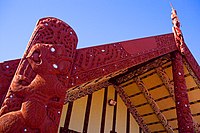Māori culture

Māori culture is the customs and beliefs of the indigenous people of New Zealand called Māori. People who are Māori have their own language, called Te reo Māori, and have been living in New Zealand for over 1,000 years.
Māori people have their own unique traditions and practices, such as the haka dance, which is a traditional war dance with loud chanting and stomping. It's often performed at important events like weddings and sports games. They also have special greetings and farewells, like the hongi, which is where two people press their noses and foreheads together to exchange breath as a sign of welcome and respect.
Māori people also have a deep connection to the land and sea. They believe that everything in nature has a life force, or mauri, and it's important to respect and take care of the environment. For example, they have sacred places, like the forests and the oceans, that are important to their culture and are protected from harm.
Another important aspect of Māori culture is whānau, which means family. Māori people are very family-oriented and they believe that family is the most important thing in life. They often have big extended families and everyone takes care of each other. Māori people also believe in storytelling and passing down their culture from generation to generation through songs, stories, and traditions.
Overall, Māori culture is rich in tradition, values, and beliefs that have been passed down for generations. It's an important part of New Zealand's history and identity.
Māori people have their own unique traditions and practices, such as the haka dance, which is a traditional war dance with loud chanting and stomping. It's often performed at important events like weddings and sports games. They also have special greetings and farewells, like the hongi, which is where two people press their noses and foreheads together to exchange breath as a sign of welcome and respect.
Māori people also have a deep connection to the land and sea. They believe that everything in nature has a life force, or mauri, and it's important to respect and take care of the environment. For example, they have sacred places, like the forests and the oceans, that are important to their culture and are protected from harm.
Another important aspect of Māori culture is whānau, which means family. Māori people are very family-oriented and they believe that family is the most important thing in life. They often have big extended families and everyone takes care of each other. Māori people also believe in storytelling and passing down their culture from generation to generation through songs, stories, and traditions.
Overall, Māori culture is rich in tradition, values, and beliefs that have been passed down for generations. It's an important part of New Zealand's history and identity.
Related topics others have asked about:
